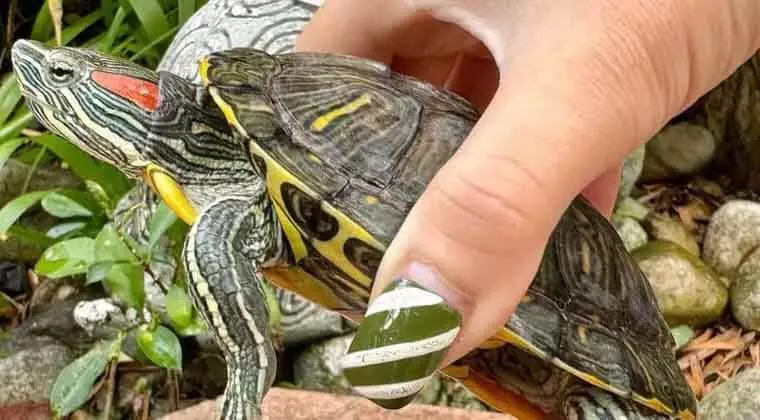Yes, turtles can eat kale. Kale is a nutritious plant-based food that can provide many essential vitamins and minerals to a turtle’s diet. It contains high concentrations of vitamins A, C, potassium, iron, and calcium which are all important for the overall health of turtles.
Turtles should be offered small amounts at a time to prevent digestive issues such as bloating or diarrhea. Kale should also be washed thoroughly before being fed to the turtle because it may contain bacteria or parasites that could make them sick if ingested.
Additionally, kale should not constitute more than 10% of a turtle’s diet due to its low protein content compared to other vegetables they might consume like collard greens or turnip greens.
What Foods are Toxic to Turtles?
Turtles are a popular pet for many people, but it is important to make sure that you know what foods are toxic to them. Many of the same human-safe foods that can be found in your kitchen can be dangerous or even deadly for turtles. Foods such as chocolate, onions, garlic, and chives contain thiosulfates which can cause gastrointestinal issues and if consumed in large enough amounts could lead to death.
Avocados have been known to induce cardiac arrest in some species of turtles so they should be avoided. While fresh fruits and vegetables provide essential vitamins and minerals for a turtle’s diet, some varieties should never be fed because they contain toxins like oxalic acid which can damage their kidneys. These include rhubarb leaves, potatoes (raw or cooked), tomatoes (green parts), and citrus fruits like lemons and limes.
Lastly, do not feed your turtle any processed food such as bread or cereals; these will lack vital nutrients needed by turtles while also being potentially hazardous due to added preservatives or salt content. By avoiding these unsafe items you can ensure that your turtle remains healthy!
Can a Red Eared Slider Eat Kale?
Yes, a red eared slider can eat kale. Kale is an excellent source of nutrients for this type of turtle and should be included as part of its diet. Red eared sliders are omnivorous creatures, meaning they will enjoy both meat and plant-based foods in their diets.
Kale is high in vitamins A, C, and calcium which are all important for the health of your turtle. You should offer kale to your red-eared slider at least once a week to ensure that it gets adequate nutrition from its diet.
When offering kale to your red-eared slider, you should make sure it has been washed thoroughly with cold water before being served raw or cooked slightly so that it becomes softer and easier for the turtle to digest.
Always serve small portions at one time since too much food could lead to digestive issues or other health problems in turtles. In addition, remove any uneaten pieces after 20 minutes so that it does not spoil inside the tank or attract bacteria growth due to decomposition.
What Vegetables Can Turtles Not Eat?
Turtles are omnivorous animals, meaning they will eat a variety of food. However, some vegetables should not be included in their diet as they can be dangerous or unhealthy for them. Vegetables such as onions, garlic, tomatoes, and potatoes contain toxins that can cause digestive disturbances in turtles and even lead to serious illnesses if consumed in large amounts.
Leafy greens such as lettuce offer no nutritional value for turtles and may also contain bacteria that can make them sick. Other vegetables like beans, peas, and mushrooms are difficult for turtles to digest so it is best avoided altogether. It’s important to check with your veterinarian before feeding any type of vegetable to your turtle so you know what is safe for them and what isn’t!
Can Tortoises Eat Kale?
Tortoises can eat kale as part of a balanced diet. Kale is high in vitamins A and C, which are important for the health of your tortoise. It’s also low in fat, making it a great snack option if your tortoise needs some extra calories.
However, kale should not be the only food that you give your tortoise – they need a variety of vegetables to stay healthy. Additionally, kale should always be fed fresh rather than frozen or canned and given in small amounts to avoid overfeeding.
Can Turtles Eat Kale And Spinach?
Turtles can indeed eat kale and spinach as part of their diet. Kale is highly nutritious for turtles, providing them with essential vitamins, minerals, and antioxidants that are important for maintaining a healthy shell and overall health. Kale also contains plenty of fiber, which helps to keep the turtle’s digestive system functioning properly.
Spinach is also an excellent choice when it comes to feeding your turtle because it provides essential nutrients like calcium, phosphorus, and magnesium that are needed for proper bone development in turtles.
Both kale and spinach should be lightly cooked before being offered as food to a turtle; this will help break down some of the tougher fibers in both vegetables so they can be more easily digested by the reptile. Feeding these two leafy greens regularly can not only benefit your pet’s health but also give them variety in their diet!
Turtle Eats Fish Alive
Conclusion
Kale can be a great addition to a turtle’s diet, as long as it is fed in moderation and supplemented with other nutrients. Turtles need plenty of vitamins and minerals to stay healthy, so adding kale to their diets can help provide some of those essential nutrients.
However, it should not make up the majority of their meals because turtles may not get enough protein from leafy greens alone. If you decide to feed your turtle kale, ensure that they are getting adequate amounts of other foods as well.
